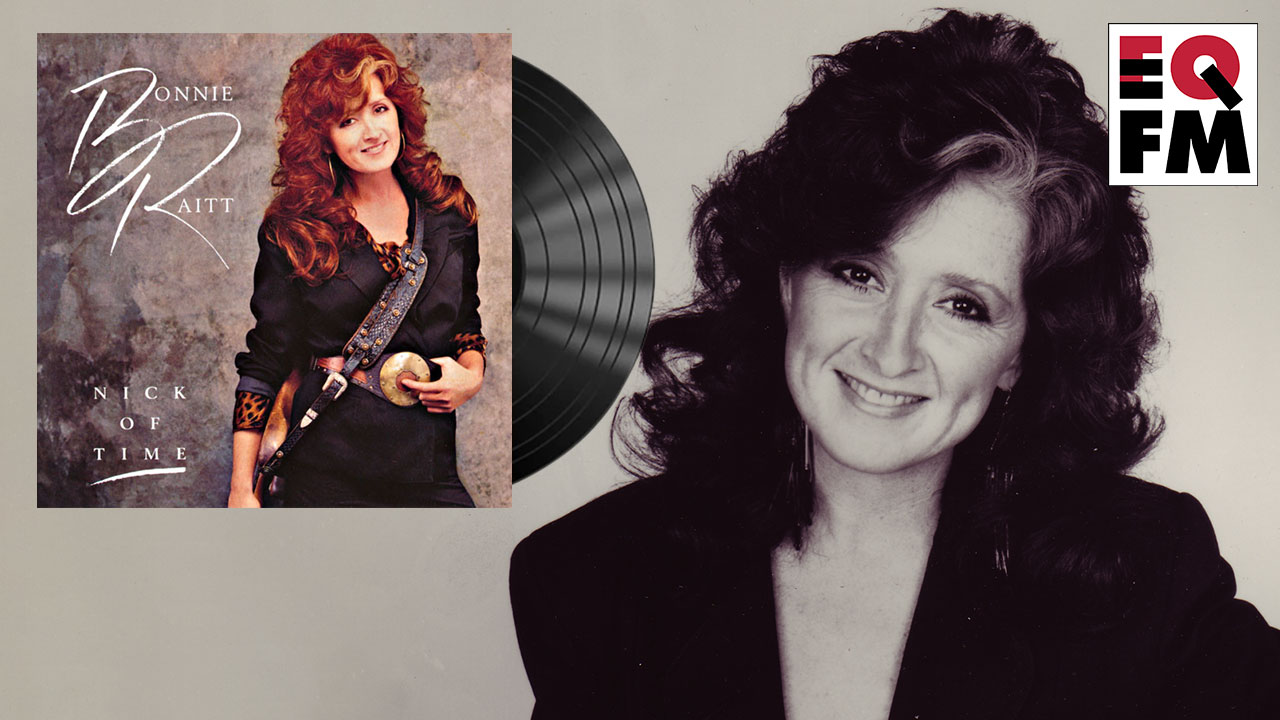Bonnie Raitt: Nick of Time

Bonnie Raitt (Capitol Records PR photo 1989 by Aaron Rapoport)
Album ReCue, a part of FUV's EQFM initiative, takes an on-air and online look back at influential releases by women that altered our perspective not only of the artist, but her invaluable impact on music history. Above, listen to a conversation with Alisa Ali and Sarah Wardrop about Bonnie Raitt's 1989 album, Nick of Time, and below, Kara Manning's overview.
Bonnie Raitt, one of the greatest blues guitarists to ever shimmy a slide down a fretboard, was nine albums into her career, battered by a biased music industry, and on the cusp of 40 when she released the album that would change her life: 1989’s Nick of Time. What a prophetic title and title track for a musician who proved that the best of a career was just beginning at middle age. Better yet, her reboot was accompanied by the perfect plot twist — Raitt won the 1990 Grammy award for Album of the Year for Nick of Time (one of four that she won that night).
The restrictive dictates and prosaic rules of the music industry in the '70s and '80s hurt musicians like Raitt; female artists who didn't fill a traditional niche were routinely discarded. Despite excellent albums like 1972’s Give It Up and 1975’s Home Plate, Raitt’s brand of gritty blues and R&B, punched with a pop-friendly afterglow, didn’t settle comfortably into the usual Top 40 or FM rock radio mix, the latter usually less than welcoming to women anyway.
Like Aretha Franklin and Dusty Springfield, Raitt became an intuitive interpreter of others’ songs too, plaiting them with husky vulnerability and toughness. But even though she had a minor hit with a 1977 cover of Del Shannon’s “Runaway,” it wasn’t good enough to vault Raitt into a viable place; she was an outlier.
Brusquely dropped by Warner Brothers Records in 1983, her hard-drinking habits escalated as she navigated a breakup and scrambled to keep touring as a musician. But following a skiing accident and tired of living the blues in all the wrong ways, Raitt got sober in 1987, a decision that not only saved her career, but her life — not hyperbole in the least. “Some people don’t get out,” she told Rolling Stone in 1990. “They die. You know, the Richard Manuels, the Paul Butterfields. There’s a whole bunch of musicians who had their drug and alcohol problems encouraged by the lack of validation for their music.”
There was a brief dalliance with Prince’s Paisley Park label and two scuttled recordings with Prince (tucked away in a vault, but "I Need a Man" has emerged). Providence and Hal Willner's Disney project, Stay Awake, led Raitt to producer Don Was and vice versa; Was was dealing with his own career crisis (“In 1986, I hit rock bottom,” he told Billboard last year, recalling Nick of Time's 30th anniversary). The pair began recording demos, labels be damned. There were over a dozen rejections before Capitol finally signed her; those early demos evolved into what became the multiplatinum Nick of Time, recorded with about 30 of the best session musicians that Raitt and Was knew, plus some starry names, like Herbie Hancock, Graham Nash and David Crosby.
Led by Raitt’s own "Nick of Time," a wistful confession of hitting existential midlife crossroads (“Life gets mighty precious/When there’s less of it to waste”), the album is a canny distillation of her strengths: that wondrously expressive voice and virtuoso slide guitar genius. Two Bonnie Hayes compositions, “Love Letter” and “Have a Heart,” are good examples of Raitt's way of transforming someone else's songwriting. In the former, Raitt opts for a smoky saunter, all brio and hope. But in the latter, there's a wholly different entreaty, a plaintive stew of dub grooves and defiance. The song's lilting opening salvo, "Hey, shut up! Don't lie to me," is a perfect entry to Raitt's point of view.
Raitt is conversational in tone when she sings, never pushing a line; she opts for ease and an unfettered honesty. The songs she writes or chooses often tell tales of exchanges gone awry, or of women working toward a better path in love or life. And in truth, Bonnie's recordings are often intense dialogues with her guitar: she wields her Fender Stratocaster like a bulwark, a Greek chorus, or a trustworthy friend. Riding the bumpy path of her own deliciously bluesy “The Road’s My Middle Name,” there’s a steely resolve to Raitt’s phrasing and playing, never surrender.
She improbably became a fixture on VH-1 and MTV too, thanks to the sexy shuffle of John Hiatt’s “Thing Called Love,” and that flirtatious video showdown between Bonnie’s ballsy slide glissades (and dimples) and Dennis Quaid’s bad boy grin. It might not be the most original video, but it made a massive impact. That exposure to a younger generation, especially teenage girls with a guitar in their sights, gave Raitt the kind of iconic stature that she relishes but still seems mystified by, even 30 years and seven albums down the line from Nick of Time.
“I have so many people who come to shows with their mothers, or with three generations, saying ‘My mom played this album for me in the car when I was little, and you're one of the artists that means the most to us,’” Raitt told Billboard in 2019. “It means so much to me that Nick of Time resonated with so many women, especially. I never expected it to have the response it did.”
Listen
WFUV's EQFM Album ReCue: Bonnie Raitt's Nick of Time

